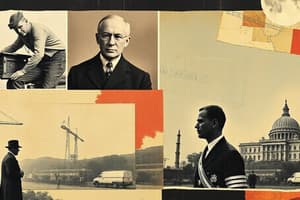Podcast
Questions and Answers
What is imperialism?
What is imperialism?
- A governor who ruled as a representative of a monarch
- The belief that race determines a person's traits and capabilities
- A political unit that depends on another government
- The extension of a nation's power over other lands (correct)
What did imperialism lead to in the late nineteenth century?
What did imperialism lead to in the late nineteenth century?
It led Europeans to control vast territories directly to take those countries' raw materials and sell them finished goods.
What new class did colonial rule create?
What new class did colonial rule create?
- Urban middle class (correct)
- Rural peasants
- Monarchs
- Slave traders
How did the new class affect colonialism?
How did the new class affect colonialism?
What raw materials did Europeans seize in West Africa?
What raw materials did Europeans seize in West Africa?
What was the goal of European missionaries in Central Africa?
What was the goal of European missionaries in Central Africa?
Why didn't the British set up universal public education in India?
Why didn't the British set up universal public education in India?
What sparked India's cultural revival?
What sparked India's cultural revival?
What provisions did the Mexican Constitution of 1917 include?
What provisions did the Mexican Constitution of 1917 include?
What caused the increase in the number of Latin Americans in the middle class in the late nineteenth century?
What caused the increase in the number of Latin Americans in the middle class in the late nineteenth century?
The definition of _____ is the extension of a nation's power over other lands.
The definition of _____ is the extension of a nation's power over other lands.
_____ soldiers were Indian soldiers hired by the British East India Company.
_____ soldiers were Indian soldiers hired by the British East India Company.
Match the following terms with their definitions:
Match the following terms with their definitions:
Flashcards are hidden until you start studying
Study Notes
Key Terms in Imperialism
- Imperialism: Extension of national power over other lands, leading to European control over territories for resource extraction and trade.
- Racism: Belief that race determines traits and capabilities, often justifying imperialist actions.
- Protectorate: A political unit dependent on another government for protection, often seen during imperial expansions.
- Indirect Rule: Colonial governance allowing local rulers to maintain authority, promoting stability and control.
- Direct Rule: Imposition of new officials from the colonizing nation, removing local elites from power.
- Annex: To incorporate territories into a larger political unit, facilitating imperial control.
- Indigenous: Refers to native populations within a region, often subjected to imperial rule.
- Sepoys: Indian soldiers employed by the British East India Company, pivotal in protecting interests in the region.
- Viceroy: A governor representing a monarch in a colonial territory, often exercising considerable power.
- Dollar Diplomacy: Use of financial resources to enhance national power and influence in foreign relations.
Impact of Imperialism
- Late 19th century saw Europeans establishing control over vast territories for resource acquisition and trade.
- The rise of a new urban middle class in colonized regions sparked resistance movements, influenced by Western education on natural rights and democracy.
Resource Extraction in West Africa
- Europeans seized vital resources such as peanuts, timber, hides, and palm oil.
- Great Britain annexed West coastal states and Nigeria, while France controlled French West Africa and Germany held smaller territories.
Missionary Influence in Central Africa
- European missionaries aimed to "civilize" native Africans; however, their activities provided geographic information that aided imperialists like King Leopold II in subjugating local populations.
Education and Colonial Control in India
- British reluctance to implement universal public education in India stemmed from costs and fears of fostering mass demands for rights.
India's Cultural Revival
- Sparked by British superiority attitudes, cultural revival included establishment of colleges, newspapers, and societies like the Triplicane Literary Society, with figures such as Rabindranath Tagore promoting national pride.
Mexican Constitution of 1917
- Established key provisions including voting rights for men, minimum wage, work hour limits, unions, land redistribution, and restrictions on foreign investment.
Growth of the Middle Class in Latin America
- Late 19th century prosperity from food and raw material exports contributed to a growing urban middle class seeking education and liberal reforms.
Resistance to Colonization
- Each region (Southeast Asia, Africa, India, Latin America) showcased distinct resistance efforts against colonization, utilizing varied tactics and having varied degrees of success or failure.
Studying That Suits You
Use AI to generate personalized quizzes and flashcards to suit your learning preferences.




